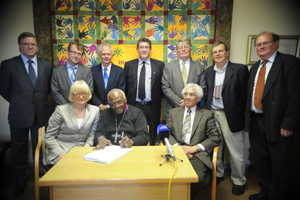Joint venture to gather data on three oceans
24 May 2010
UCT, the Nansen Environmental Centre in Norway and their partners are setting up a joint venture in South Africa to gather information about the three oceans around southern Africa, to better understand and deal with global change across the continent.
The Nansen-Tutu Centre for Marine Environmental Research aims to develop and implement operational oceanography and methods of data integration into models in the South Atlantic Ocean, the Indian Ocean and the Southern Ocean. They will focus on ocean state, marine environmental and ecosystem modelling, research and capacity-building, including the oceans' roles in climate and global teleconnections - the relationship between climate anomalies in different parts of the world.
"We have identified a gap that badly needs filling in order to understand and deal with global change in Africa," said Professor John Field, the Director of the Marine Research Institute (MA-RE) at UCT. "There is a worldwide need to understand, model and predict conditions in the ocean, just as meteorological services do for the weather."
The partners will develop a system to collect data routinely via satellite and direct observations in the ocean - what the team likes to call operational oceanography, explains Field.
The centre has been named to honour two men - a Norwegian and a South African - who have demonstrated a passion for the natural environment as well as humanity. Dr Fridtjof Nansen was honoured as a Nobel Peace Laureate for his humanitarian work in helping to resettle millions of people displaced by political boundaries after World War I. But he was also a noted sportsman, scientist, explorer and philosopher, who led a successful expedition to the North Pole in 1893. He is widely regarded as one of Norway's greatest sons.
Similarly, Archbishop Desmond Mpilo Tutu, also a Nobel Peace Laureate and a "rabble-rouser for peace", is one of South Africa's greatest sons. He campaigned peacefully against apartheid, chaired the Truth and Reconciliation Commission after South Africa's first democratic elections in 1994, and has worked tirelessly for peace in the world since his 'retirement' as Archbishop of Cape Town. The Nansen-Tutu Centre has been greatly honoured by Archbishop Tutu allowing his name to be associated with this partnership.
Africa juts into the Indian, South Atlantic and Southern Oceans with cool and warm oceans juxtaposed, giving rise to unique marine and land ecosystems with high biodiversity, rich fisheries and superb natural resources, that contribute not only to food production but also to South Africa's vibrant tourism industry. It is therefore important, from an economic and ecological perspective, to develop the capacity for understanding and predicting the state of the ocean and its ecosystems. The founding partners of the Nansen-Tutu Centre have complementary expertise and knowledge to address these challenges.
The partners include the African Centre for Climate and Earth System Studies; the South African Council for Scientific and Industrial Research (CSIR); the Nansen Environmental & Remote Sensing Centre, in Norway; the Institute of Marine Research/Centre for Development Cooperation in Fisheries, Norway; the University of Bergen, Norway; and Princeton University, New Jersey, USA.
The Nansen-Tutu Centre will be directed by a South African and will employ local staff in order to help build capacity. A board of four South Africans and four Norwegians will oversee the programme. The centre will be based in Cape Town and will complement the developing South African marine research framework. Activities are expected to be run by six scientists - three funded by Norway, the rest by South African sources - and their students under the management and financial control of UCT. The initial phase will be for three years, with an option for renewal.
The aims of the Nansen-Tutu Centre include:
- The generation of joint research and development activities between scientists and students from the partner institutions and the Nansen Group.
- The exchange of visiting scientists and students between the participating institutions.
- Co-supervision of post-graduate students.
- Coordinating and facilitating joint project proposals to be submitted for funding through national, EU and international bodies.
- Technical development, infrastructure and support for pre-operational production and demonstration of information and services.
- Developing capacity through joint courses, workshops, training and research schools.
- Ensuring integration with other operational components within UCT's OceanSAfrica programme, to include the user community.
- Ensuring open and free access to the centre's resources, data, products and achievements.
- Cooperation in the fields of distance educational courses and research programmes.
- Joint participation in field campaigns.
- The stimulation of international collaboration and activities with the Global Ocean Observing System (GOOS), GOOS-Africa, relevant components of Group on Earth Observations, Phase2 of the Global Ocean Data Assimilation Experiment and the sustainable Marine Core Service (e.g. MyOcean).
- Outreach, including development of a web page, public interface with research, media and the involvement of stakeholders and users.
 This work is licensed under a Creative Commons Attribution-NoDerivatives 4.0 International License.
This work is licensed under a Creative Commons Attribution-NoDerivatives 4.0 International License.
Please view the republishing articles page for more information.








